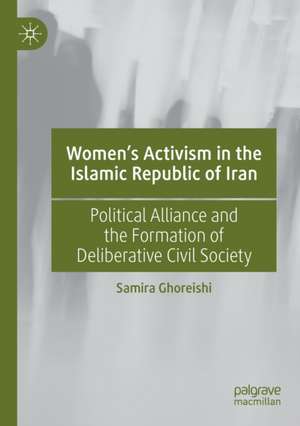Women’s Activism in the Islamic Republic of Iran: Political Alliance and the Formation of Deliberative Civil Society
Autor Samira Ghoreishien Limba Engleză Paperback – 22 mar 2022
This book will be of interest to scholars in Gender Studies and Middle Eastern Studies, particularly those who study women's and other social movements in Iran.
| Toate formatele și edițiile | Preț | Express |
|---|---|---|
| Paperback (1) | 762.39 lei 6-8 săpt. | |
| Springer International Publishing – 22 mar 2022 | 762.39 lei 6-8 săpt. | |
| Hardback (1) | 767.35 lei 6-8 săpt. | |
| Springer International Publishing – 22 mar 2021 | 767.35 lei 6-8 săpt. |
Preț: 762.39 lei
Preț vechi: 929.75 lei
-18% Nou
Puncte Express: 1144
Preț estimativ în valută:
145.95€ • 150.10$ • 121.08£
145.95€ • 150.10$ • 121.08£
Carte tipărită la comandă
Livrare economică 20 februarie-06 martie
Preluare comenzi: 021 569.72.76
Specificații
ISBN-13: 9783030702342
ISBN-10: 3030702340
Ilustrații: XIII, 192 p. 2 illus. in color.
Dimensiuni: 148 x 210 mm
Greutate: 0.25 kg
Ediția:1st ed. 2021
Editura: Springer International Publishing
Colecția Palgrave Macmillan
Locul publicării:Cham, Switzerland
ISBN-10: 3030702340
Ilustrații: XIII, 192 p. 2 illus. in color.
Dimensiuni: 148 x 210 mm
Greutate: 0.25 kg
Ediția:1st ed. 2021
Editura: Springer International Publishing
Colecția Palgrave Macmillan
Locul publicării:Cham, Switzerland
Cuprins
1. Introduction.- 2. Theoretical Framework.- 3. Women and Media: A Deliberative Engagement.- 4. Women and Civil Society Activism.- 5. Women’s Parliamentary and Extra (Outside)-Parliamentary Activism.- 6. Conclusion.
Notă biografică
Samira Ghoreishi is an Iranian feminist researcher and women’s and children’s rights advocate based in New Zealand. Her scholarship focuses on analysing women’s public activism in non-secular and non-democratic contexts.
Textul de pe ultima copertă
Through an intersectional feminist re-reading of the Habermasian theoretical framework, this book analyses how women's activism has developed and operated in the Islamic Republic of Iran. Chapters look at three key areas of women's activism in Iran: how women deliberately engaged with media activism despite the government's controlling and repressive policies; women's involvement in civil society organisations, institutions and communities, and cooperation through multilevel activism; and women's activism in the political sphere and its connection with media and civil society activism despite the theocratic system. Drawing upon interviews, analyses of journal and newspaper articles and documentary/non-documentary films, as well as personal experiences, observations and communications, the book examines to what extent Iranian women's rights' groups and activists have collaborated not only with each other but with other social groups and activists to help facilitate the formation of a pluralist civil society capable of engaging in deliberative processes of democratic reform.
This book will be of interest to scholars in Gender Studies and Middle Eastern Studies, particularly those who study women's and other social movements in Iran.
Samira Ghoreishi is an Iranian feminist researcher and women’s and children’s rights advocate based in New Zealand. Her scholarship focuses on analysing women’s public activism in non-secular and non-democratic contexts.
Samira Ghoreishi is an Iranian feminist researcher and women’s and children’s rights advocate based in New Zealand. Her scholarship focuses on analysing women’s public activism in non-secular and non-democratic contexts.
Caracteristici
Applies a feminist-rereading of Jurgen Habermas's democratic theory to women's activism in Iran Draws not only on interviews and reporting but also on the author's own involvement in activism in Iran Looks at multiple areas of women's activism across media, civil society, and the political sphere
